10 Signs of an Unhealthy INFJ
The INFJ is one of the most misunderstood personality types in the Myers-Briggs community. They are often touted as wizards or berated as “snowflakes”. So many people mistype as INFJs that a lot of mixed-up information has been developed as a result.
When you read a type description of an INFJ, chances are you’re reading about a very well-developed, mature, never-in-a-bad-mood INFJ. If you’re trying to find your personality type and you’re only reading examples of extremely evolved INFJs, it might be confusing if you’re at a different place in your development. I for one am not always perfect and healthy. I don’t constantly come up with profound insights and react with grace to everyone in my environment. If you are like that 100% of the time, then I applaud you! And I also want to know your secrets 😉
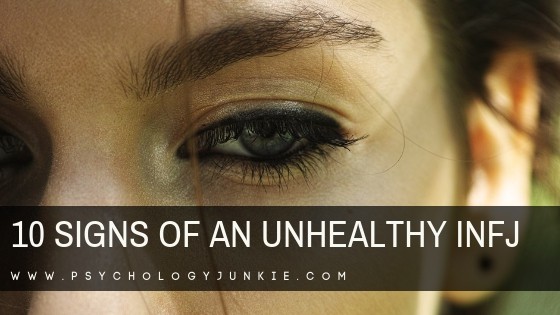
Today we’re going to talk about unhealthy INFJs. INFJs can become unhealthy for a variety of reasons: stress, an environment that doesn’t nurture their needs, or overuse or repression of specific mental processes. All INFJs go through phases where they are unhealthy (nobody’s perfect!), but knowing the warning signs can help you avoid some of these bad behaviors!
Because the reasons INFJs become unhealthy are so varied, it’s unlikely that you will relate to all 10 of these issues. Some of these habits result from stress, some from poor self-esteem, and some from inflated self-esteem!
Disclaimer: I LOVE INFJs – this article is not meant to shame INFJs or to bash them. Each type has different ways they can react to being unhealthy or immature and each type has strengths and unique capabilities.
10 Signs of an Unhealthy INFJ
Not sure what your personality type is? Take our new personality questionnaire here. Or you can take the official MBTI® here.
#1 – They try to keep other people happy, but they resent them as a result.
Both healthy and unhealthy INFJs desperately want harmony in their environment. They like to meet people’s needs and make sure the people around them are happy. We feed off of happiness and harmony. It’s hard for us to relax without it! But healthy INFJs know when to say no, and they don’t begrudge people the favors they do for them. Unhealthy INFJs have a tough time saying no, and they harbor bitterness towards the people they are helping. They keep a mental checklist of all the things that they’ve done for others and compare how little is done for them in return.
#2 – They leave arguments instead of hearing other people’s perspectives
Unhealthy INFJs are very attached to their subjective viewpoint and can become quite stubborn about their opinion. Instead of having a friendly debate where both sides are heard respectfully, they tend to state their opinion and then leave. This gives their opponent no opportunity to state their case. This tends to happen when INFJs repress their auxiliary function, Extraverted Feeling or don’t develop their dominant or tertiary function (intuition or thinking) in positive ways.
Healthy INFJs are all about perspectives. They LOVE to hear other people’s perspectives and empathize with other people’s points of view. They don’t mind a challenge or a new way of looking at things, in fact, it excites them!
#3 – They can be over-sensitive and self-absorbed
Unhealthy INFJs have a hard time not taking everything personally. They view any form of criticism as a personal attack and can quickly create a “me versus the world” scenario in their mind. They “door slam” too easily, and they may take on the role of “misunderstood misfit” as a way of coping with their isolation.
P.S. Lots of types can become over-sensitive and self-absorbed, this is definitely not exclusive to INFJs!
#4 – They are hyper-sensitive to the body language and comments of others
Unhealthy INFJs tend to become paranoid about what other people are thinking of them. They can misinterpret body language or harmless comments into signs that others dislike them or hate them. They crave a lot of reassurance and validation from the ones they love. On the flip-side, they can also become reclusive because they experience so much stress trying to decode other people’s intentions.
Why does this happen? In my experience, I’ve seen this most frequently with INFJs who haven’t had a lot of positive affirmation in their life. Many INFJs have experienced growing up in environments where they were misunderstood or their strengths were viewed as weaknesses. Once INFJs own their strengths (and accept their weaknesses for what they are) they can experience more personal confidence and growth and less insecurity.
#5 – They have zero tolerance for conflict
INFJs hate conflict, even if they are healthy. However, healthy INFJs take the time to hear every perspective. They realize that respectful conflict can promote growth. Unhealthy INFJs either leave conflict directly or insist that other people “make up” as quickly as possible. This is because INFJs tend to absorb the feelings of the people they are with, which means if there is anger or frustration in the environment they feel stressed or frustrated. In an effort to feel better themselves, INFJs may try to take control of the conflict situation and end it prematurely.
#6 – They are reclusive and avoid attachments and responsibilities
As introverts, INFJs naturally re-charge by getting time alone. However, some INFJs take this too far and completely isolate themselves from others. They get wrapped up in analysis but they don’t bring their ideas out into the open. INFJs need to harness their extraverted functions, feeling and sensing, in order to make their ideas and insights usable in the real world. It’s important for INFJs to balance regular alone time with activity in the outside world. Getting feedback from friends and engaging in new experiences inspires them and gives them new ways to bring their ideas to fruition.
#7 – They struggle with regular binge-eating, over-exercising, or impulsive behaviors
INFJs who are experiencing a “grip” stress reaction can become abnormally focused on indulgent sensory experiences. If you have been experiencing chronic or extreme stress for a long time you might find yourself wanting to throw caution to the wind and eat everything in your pantry, organize your possessions obsessively, or spend all day in bed binge-watching Netflix. If you find yourself doing this repeatedly, try to see where the stress is in your life and find some ways to de-stress.
#8 – They see themselves as more enlightened than others
Some unhealthy INFJs can become pretentious because they feel so different from other people. They can get stuck thinking that they are better or more valuable than other types. They might see sensing types as narrow-minded, thinking types as cold, or perceivers as lazy. Pay attention to your thoughts. If you’re giving the people around you one-dimensional descriptors or labels then you might be in an unhealthy state. Healthy INFJs are able to appreciate the differences in each individual and admire both their strengths and the strengths of others.
#9 – They are incurably perfectionistic
INFJs tend to be perfectionists, but unhealthy INFJs take this to a whole new level and feel trapped in a cycle of self-criticism and unattainable high-standards. They re-read every text, email, or letter they send multiple times. They are terrified to share their ideas for fear of rejection. They have an inner-critic that chastises every decision they make. They burn themselves out trying to be perfect so that they can be above reproach and invulnerable to criticism. You can find out more about the INFJ perfectionist here.
#10 – They forget that they matter
Many INFJs go through phases where they feel so responsible for other people’s emotions that they steamroll over their own needs and desires in the process. It’s hard for them to stand up for what they want sometimes because they’re so afraid of saying “no” or being seen as selfish. It’s important for INFJs to remember that they matter, and that their desires and needs have to be included in their priorities. Personality Hacker has a great article about this here.
What Are Your Thoughts?
Do you have any input for INFJs who are in an unhealthy phase of their life? Let us know in the comments! If you’d like to know more about the INFJ personality type, be sure to check out my eBook here!
Other Articles You Might Enjoy:
10 Things That Excite the INFJ Personality Type
24 Revealing Quotes About the INFJ Personality Type
7 Things that INFJs Experience As Children
3 Weird and Wonderful Secrets About the INFJ Personality Type
Subscribe to Our Newsletter

Want to discover more about personality type? Get the inside scoop with Susan Storm on all things typological, along with special subscriber freebies, and discounts on new eBooks and courses! Join our newsletter today!


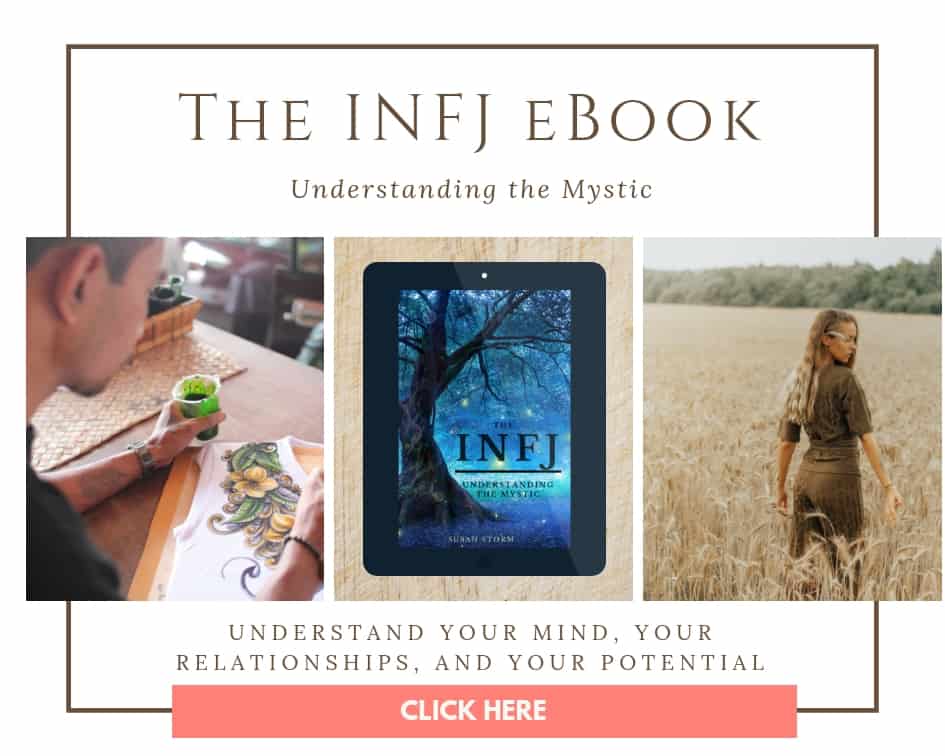



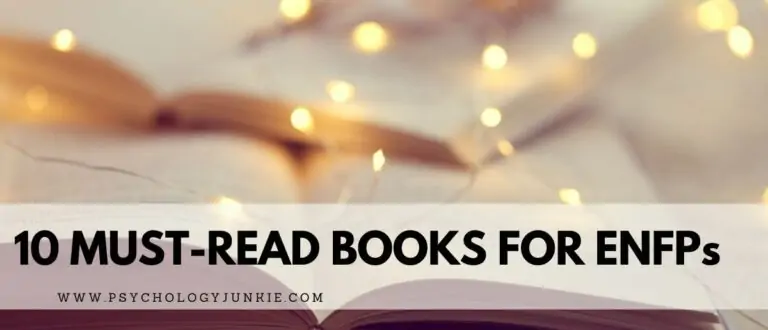
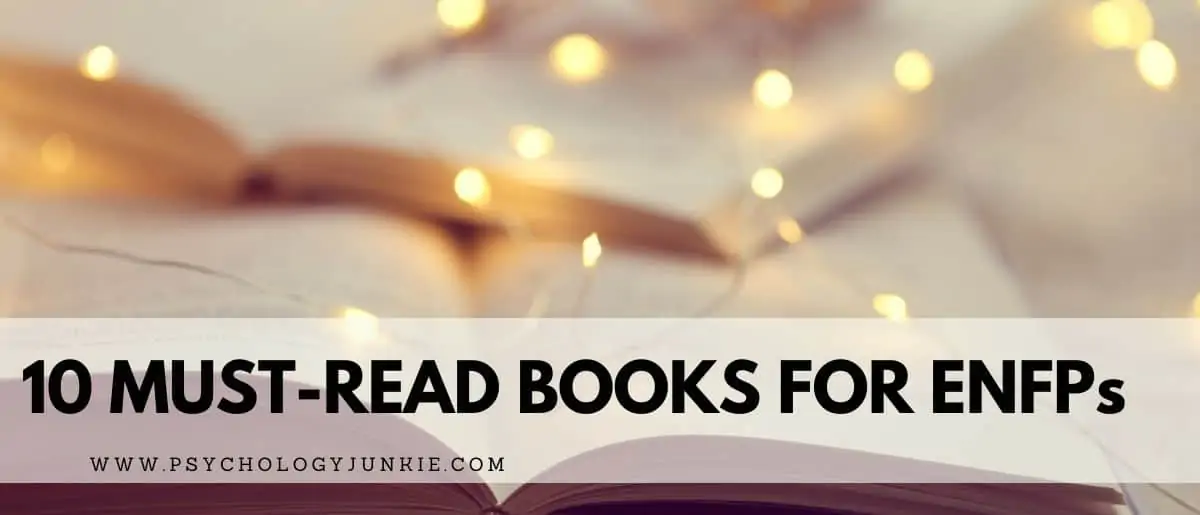
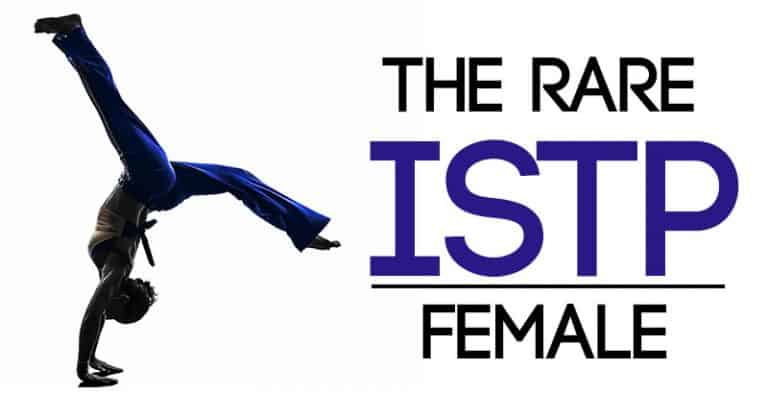
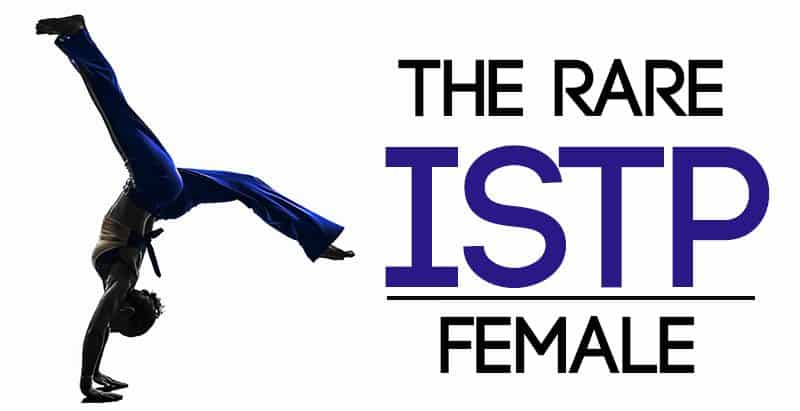





yea, i’ve been everyone of the 10 at some point in my life…..
This is where I am. I want to know what to do to change things around. Any thoughts?
Was there any advice on your query? My partner is all 10 of these and unfortunately it’s stopping us from having a deeper connection…
10/10, all of these unhealthy signs are on me now. Hahahahahahaha :”)
You’re an amazing person Susan! I resonate with almost all 10 of these.
I freely admit to being an unhealthy INFJ. I’ve stifled Ni growing up, developed Ti as my main function behind Fe, as my auxiliary function. Se stays my tertiary while Ni becomes my inferior function. I have all the right cognitive functions in the correct order but with a different starting place: Fe:Ti:Se:Ni
To repair the damage I must shift Ni back to becoming my dominant function. Then grow Fe as my auxiliary with a fully developed Ti as my very strong tertiary function to back it all up. Se is still lucky last & I still have no pleasure staying there…. Yet.
A thought provoking article. Very good Susan!
Just going to leave this here, the results from your own website so that unable to prove I am not mistyped.
You are the INFJ “Mystic”
Result Image
As the Mystic personality type, you are wired to notice the future implications of the things happening around you. You tend to have deep insight into people and situations. This is because rather than seeing what’s on the surface, you look for the underlying reasons why people do what they do. You’re someone who reads-between-the-lines, notices patterns, and picks up on symbolic meaning.You are also deeply concerned with how your choices will impact other people. You care about harmony, maintaining morale, and improving the emotions of the people around you. This tends to make you skilled in the art of counseling.
Your Strengths Include:
– Ability to sense the underlying reasons for things.
– Foresight into future implications and effects.
– Empathy for the emotional states of others.
– Strategic planning abilities.
Find Out More About Your Type!
SHARE YOUR RESULTS
Oof. Deeply in all of these and tough to be called out. Only just learned about the Ni-Ti loop this morning so I am going to try and integrate more extroverted sensing into my life. Thank you for this article. I have been trying to figure out (Ti) if my actions in recent conflicts have been justified (I door slammed) and it’s helpful to remember that this part of me represses the side of me that is open and compassionate to others feelings. I’ve been feeling so stressed out and sensitive because I’ve been on the Fi-Ti loop for years and it’s just made it all get worse and worse – no progress in my visions, going nowhere in life, isolating myself. I’m just so overwhelmed that I can’t handle any criticism anyone says to me unless it’s said gently. Pretty much lately I’ve been feeling like if someone’s not coming to hug me they can get out of my life. 🙁
Thank you for this! I’ve been see-sawing between average and unhealthy for a very long time. I do retain the memory of being “healthy” and I am working on finding my way back to that place. This article has helped me differentiate between healthy modes of self-isolating, judgemental, door slamming behaviour and downright reclusive and harsh behaviour which I’ve defended as being ” just my personality type” but knowing deep inside that it’s not. This article validates my deepest feelings of unease relating to my unhealthy behaviour. xx
Very good article. One of my biggest mistakes is that i’ve tried to establish rapport with too much people, mimicking their body language, tonality, following their expectations and focusing more on their point of view rather than stating my real opinion in order to avoid conflict and believing that they will change if they are seeing that I can be like them.
Also is very unhealthy when you stay too much in your head, overplanning stuff and not paying attention to details. We must remember that we can’t force people to change and please them all the time.
Socrate once said that the hardest battle is with ourselves.
Voltaire said that, not Socrate.
I’ve seen myself on many sides of the spectrum, but with age I have grown to be a mostly healthy INFJ. At my best, I sometimes behave more like an ISFP (when I cultivate my artistic tendencies), although my default is and surely always will be INFJ. At my worst, I cultivated a very long-time “best friendship” with a Narcissist; so, I think my most important life advice for any unhealthy INFJ is to please be mindful of who you keep in your life (and perhaps even more importantly, in your thoughts)
Excellent analysis, as usual. Re point #1, the resentfulness comes when I don’t get any sense of being appreciated and notice it to be the trend. A gesture as simple as an appreciative glance is more than sufficient for me and makes my day!